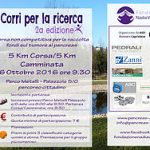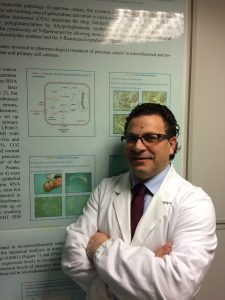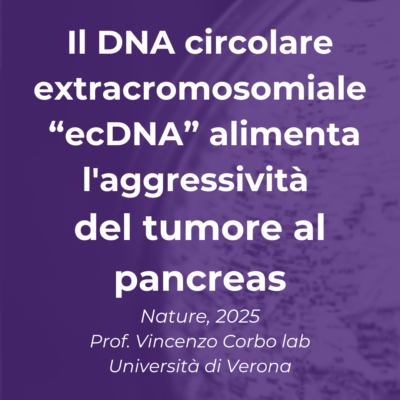
Corri per la ricerca 2016, seconda edizione
Ottobre 16, 2016
Family Cup 2016
Ottobre 19, 2016Niccola Funel, PhD
Cancer Pharmacology Lab, Universita’ di Pisa, Italia
Since the past ten years Dr. Niccola Funel is interested in both basic and clinical research of pancreatic cancer, including the most aggressive forms such as ductal adenocarcinoma (PDAC) and intraductal papillary mucinous neoplasms (IPMN).
Education
Dr. Funel studied at the University of Pisa, where he first graduated in Biology. Later he obtained the PhD in “Experimental and Molecular Oncology (2006) and the specialization in “Clinical Pathology” (2008). He was then awarded with the “Young Investigator Grant” by Umberto Veronesi Foundation (2013). Recently he has been working in the Laboratory “AIRC Start-Up” of Dr. Elisa Giovannetti in Pisa, with whom he has a strong working relationship since his interest on pancreatic cancers. During this period Dr. Funel developed several partnerships, both national and international. He is currently partner in three major scientific organizations such as The Pancreas Club (USA), the European Pancreatic Club (EPC) and the “Associazione Italiana per lo Studio del Pancreas” (AISP), where he obtained for seven times the “Best Presentation Award Price” and he was also in the adviser board from 2012 to 2014.
Research interest
Since the beginning of his studies Dr. Funel focused on the preparation of primary cell cultures and laser microdissection studying the expression of molecular markers of pancreatic cancer at the protein level. Using primary cell cultures from patients with PDAC, whom underwent resective surgery, Dr. Funel created pre-clinical models ranging from simple 2D system in vitro, to the orthotopic murine model of PDAC, passing through the realization of intermediate prototypes such as the 3D model of polymeric scaffolds.
Using laser microdissection (LMD) it was possible to isolate the epithelial component of the PDAC that represents the true target for surgeons, pathologists, oncologists and pharmacologists. Thank to these population of “pure” tumor cells, it was possible to characterize the tumor at the genetic, epigenetic and transcriptional level. These studies revealed the prognostic significance of some RNA molecules including the Human equilibrative nucleoside transporter 1 (hENT1) and 21 microRNAs (miR-21). It is well known that the PDAC exhibits an intense desmoplastic reaction which in some cases is so excess in the tumor component that can “mask” the actual genetic arrangement of the tumor. For this reason, the two methods described above have complemented each other in understanding the true tumor phenotype, both in the tissues and in the cell culture.
Furthermore the chance to study the protein expression of the most common molecular markers involved in this cancer has enabled the research team to evaluate the phenotypic changes of the tumor as a result of new discoveries made in the field of epigenetics (the microRNA era). Therefore the researchers developed automated methods for the realization of tissue-chips (TMA) to accelerate the creation and analysis of tumor markers and to reduce the costs for research.
Future prospective on pancreatic cancer
“In recent years the knowledge of this oncological disease (that has to be study in a multidisciplinary way) have greatly ameliorates”. “Lately”, Dr. Funel said, “the prognosis of these patients has been improved, but we are still far from being able to define pancreatic cancer as a curable disease in a significant percentage of patients. The next goal of researchers involved in this study will be to transfer the new insights at the molecular and nano-structural level of this disease at an early clinical phase, in order to have a better therapeutic treatment for the patients.
You can find more information about Dr. Funel’s research here and here .





